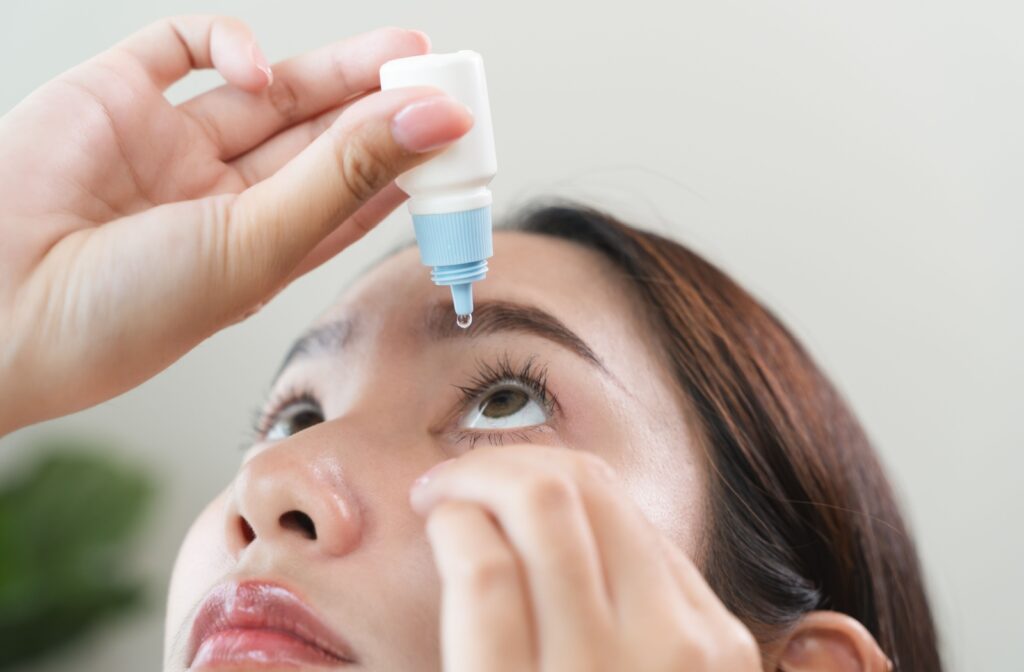Meibomian Gland Dysfunction (MGD) is an eye condition that occurs when the Meibomian glands are blocked or can’t produce enough oil to lubricate the eyes. This can lead to other painful visual conditions. Luckily, MGD can be easily identified during eye exams and extensive treatments are available.
What Causes Meibomian Gland Dysfunction?
The Meibomian glands are glands that line your eyelids. The Meibomian glands secrete oils that cover the eye and prevent the tears that lubricate the eye from drying out too quickly. MGD occurs when these glands are blocked or don’t produce enough oil. When the oil layer that the Meibomian glands produces is disrupted, the tears that lubricate our eyes evaporate too quickly, leading to dry and irritated eyes.
Risks of Meibomian Gland Dysfunction
If unmanaged, MGD can cause other visual health problems. The most frequent visual health problem that MGD causes is Dry Eye Syndrome (DES). DES refers to when your eyes either can’t produce enough of the tears that lubricate your eyes, or the tears evaporate too quickly, leading to dry eyes that can be very painful.
Another common health issue that MGD can cause is Blepharitis. Blepharitis is when the eyelids become inflamed. This inflammation of the eyelids can cause the loss of eyelashes, light sensitivity, eye redness, and more.
Both Blepharitis and DES can lead to corneal damage if left untreated, so it is important to manage MGD symptoms before they cause other conditions. Having MGD can also increase your risk of experiencing DES or Blepharitis after eye surgery, even if you haven’t previously experienced either condition.
Increased Risk of Meibomian Gland Dysfunction
MGD is a common condition, with as many as 21% of people experiencing MGD. Some people are at a higher risk of developing MGD than others. Certain medications and medical conditions can also increase the risk of developing MGD.
Risk Factors
Some groups have higher risks of developing MGD than others, some risk factors that may make you more likely to develop MGD are:
- Individuals of Asian ethnicities are more likely to develop MGD than other ethnicities.
- As you age your risk of developing MGD increases.
- Men are more likely to develop MGD than women.
- Wearing contacts increases the risk of MGD developing.
- Having tattoos on your eyelids may cause MGD.
Medical Conditions Linked to MGD
Having any of these medical conditions also increases your chances of developing MGD:
- Allergic conjunctivitis (eye allergies)
- Autoimmune disorders like Rosacea, Lupus, Sjӧgren’s Syndrome, and Rheumatoid Arthritis
- High blood pressure or cholesterol
- Stevens-Johnson Syndrome
- Repeated or severe eye infections
- Aniridia (lack of iris)
Medications and MGD
Taking certain medications used for acne, antidepressants, and hormone replacement therapy have been linked to developing MGD.
Symptoms of Meibomian Gland Dysfunction
There are many signs of MGD. If you experience any of the following signs, consult your optometrist or ophthalmologist immediately.
- Dry, itchy or burning eyes
- Redness or soreness in the eyes
- Eyes feeling like there is something stuck in them
- Rough or uneven inner rim of the eyelid
- Swollen eyelids
- Blurred vision
- Irritation when wearing contact lenses
Testing for Meibomian Gland Dysfunction
Diagnosing MGD may take more than a single test, and optometrists will usually use multiple tests when checking for MGD. Some tests that your optometrist may use include a Schirmer Tear Test, which involves checking to see if your eyes produce enough tears to keep your eyes lubricated. Another test used by optometrists to diagnose MGD includes a Slit Lamp Exam, where optometrists will magnify the eye to take a close look at the different sections of the eye.
At Advance Eye Care Center, we also offer Meibographies, which is an up-close examination of the Meibomian glands. This allows us to see if the Meibomian glands are producing enough oil, and to find any potential blockages.
Professional Treatments for Meibomian Gland Dysfunction

While there currently is no cure for MGD, there are many treatments that can help to alleviate discomfort caused by MGD. At Advance Eye Care Centre in Regina, we have a variety of treatments for DES and MGD. Some of our treatments include:
- BlephEx: BlephEx is used to clean the eyelids to alleviate the symptoms associated with MGD, Blepharitis, and DES. BlephEx treatments are carried out by eye care professionals in a clinic.
- Xiidra: If your MGD has caused DES, Xiidra can be used to provide temporary relief from symptoms of DES.
Depending on your current treatment plan, or any other medical conditions you may have, treatment can also include:
- Antibiotics
- Cyclosporine
- Steroids
The only way to find the best treatment for you is by undergoing a comprehensive eye exam and consulting with a professional. Our knowledgeable team at Advance Eye Care Center would like to help you find a treatment plan for you. Let us help you with your vision concerns by booking an appointment.





